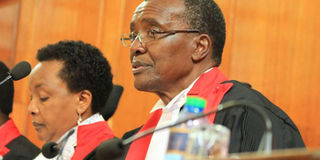Let Supreme Court not abet an unlawful change of government

Chief Justice David Maraga reads the presidential poll petition judgment at the Supreme Court, Nairobi, on September 1, 2017. Owing to the ruling, Nasa has called for the dismissal of key IEBC officers. PHOTO | JEFF ANGOTE | NATION MEDIA GROUP
What you need to know:
- But despite its highly liberal formulation, this Constitution has rarely been described as revolutionary or disruptive.
- The Constitution faces its greatest challenge yet in mediating the 2017 presidential election.
The 2010 Constitution has been variously hailed as progressive, liberal and one of the most modern.
An expansive Bill of Rights, a circumscribed Executive and an ethos for participatory development through devolution of power to 47 counties are its hallmarks.
But despite its highly liberal formulation, this Constitution has rarely been described as revolutionary or disruptive.
POLL PETITION
In sum, it creates norms and institutions for orderly governance and stable social relations.
A complex system of checks and balances ensures no institution can usurp public authority in a manner that erodes the foundational premise of the Constitution to create an open and democratic society.
However, this constitutional order appears besieged.
The Constitution faces its greatest challenge yet in mediating the 2017 presidential election.
SUPREME COURT
Since its abridged September 1 declaration invalidating President Uhuru Kenyatta’s re-election, the Supreme Court opened an unexpected constitutional chasm that could thrust the country into a constitutional crisis.
Although the Constitution contemplates that a presidential election dispute presented before the Supreme Court could result in an annulment, it is, nevertheless, clear that such a situation must be followed by a fresh poll within 60 days.
The court impugned the conduct of the Independent Boundaries and Electoral Commission (IEBC), which it found to have “failed, neglected or refused to conduct the presidential election in a manner consistent with the dictates of the Constitution” and “committed irregularities and illegalities, inter alia, in the transmission of results….”
NASA DEMANDS
The effect of holding IEBC culpable for failed elections is to impair its capability to hold fresh polls within the requisite period.
Already, the ruling has provided a veritable set of incentives to a coterie of actors to demand far-reaching changes to the election management.
Nasa has called for the dismissal of key IEBC officers, contracting of a different printer of ballot papers and, most crucially, access to most security features of the election technological interface.
These demands — if they were to be granted — will have at least two discernible effects.
DEMONSTRATION
First, the IEBC’s capacity to deliver an election on time will be highly doubtful because the removal of personnel with expertise and institutional memory will render it unable to achieve set targets.
Secondly, access to IEBC’s security protocols will render its data vulnerable, making real the allegations of hacking and increasing chances of the fresh poll being found not to meet the threshold of being free and fair.
Meanwhile, Nasa has been categorical that it will ensure no poll is held on October 17 or at all unless its demands are met.
The only way it can enforce its threat is by fomenting an uprising to disrupt the ongoing preparations by the IEBC (no proper court will order an extension as period is constitutionally delimited).
ILLEGAL
The resurgence of coups in Africa prompted the African Union to formulate norms on unconstitutional changes of government.
Any change that is an infringement on the principle of democratic change of government or inconsistent with the Constitution is unconstitutional and impermissible under international law.
The principle of democratic governance is further sanctified in AU’s Charter on Democracy, Elections and Governance.
JUDGMENT
Although judicial coups were never in the contemplation of the drafters of these continental norms, the Supreme Court must ensure that it does not become the handmaiden by which unconstitutional change of government — with its attendant instability, chaos and violence — is perpetrated in the country.
It must provide an iron-clad reasoned judgment that will curtail any attempt at subverting the constitutional requirement that a fresh poll must ensue within 60 days of the annulment of the first.
Dr Sing’Oei is a legal adviser, Executive Office of the Deputy President.




